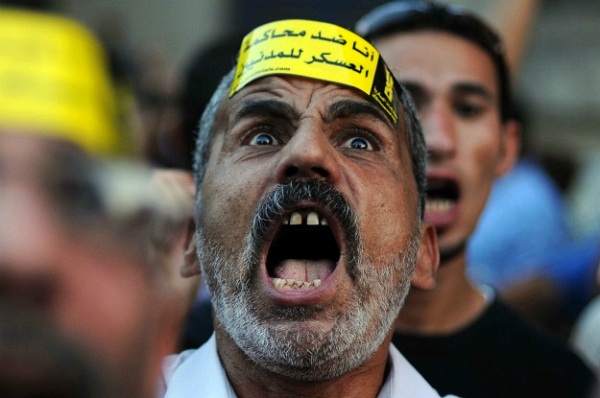
(AFP Photo)
Foreign Minister Nabil Fahmy met with a European Union (EU) envoy headed by EU Ambassador James Moran in Cairo on Tuesday to discuss the future of EU-Egypt relations.
The meeting came one day ahead of the EU convening an “extraordinary” Foreign Affairs Council meeting at its Brussels headquarters to discuss how its members will respond to the current situation in Egypt.
In his meeting with Moran, Fahmy expressed “shock” at the EU failing to release a statement strongly condemning “terrorist acts,” include the burning of police stations and churches and the attacks on security troops in Sinai that have left 25 dead, according to a statement from the ministry of foreign affairs.
The minister also emphasised to the EU envoy that the Egyptian government has the right to protect its citizens from “violence and terrorism.” He added that it is vital for the transitional roadmap to progress uninterrupted by these attacks in order for Egypt to establish a democratic state.
The EU is to review its relations with Egypt, with talks of imposing an arms embargo and freezing its foreign aid, in light of the government’s recent crackdown on supporters of ousted president Mohamed Morsi.
It released a press statement on Wednesday that outlined the status of Egypt-EU relations during the rule of former president Morsi and after his ouster.
“In recent weeks, the EU deployed intense efforts to promote dialogue and a peaceful solution to the Egyptian crisis through its constant engagements with all parties,” the statement read, referring to unsuccessful efforts for national reconciliation and dialogue made in July by EU foreign policy chief Catherine Ashton and EU’s Special Representative for the Southern Mediterranean Bernardino Leon.
The statement also said that the “extraordinary” meeting is to convene after EU members expressed strong concern over the “tragic” events that have unfolded in Egypt this month.
There are several key points of cooperation that could be affected due to this review of EU-Egypt relations.
In November 2012, the EU had pledged €5bn in financial support to Egypt in the form of grants and loans.
In the 2007-2013 financial period, its European Neighbourhood Partnership Instrument has made available more than €1bn to Egypt. Its other financial instruments, including the European Instrument for Democracy and Human Rights, have provided support that amounts to nearly €23m.
EU and Egypt are also major trading partners in the Southern Mediterranean region, with bilateral trade reaching its highest level ever, with €23.8m, in 2012.
Fahmy held a separate meeting on Wednesday in which he told UN Under-Secretary-General for Political Affairs Jeffrey Feltman that Egypt is angered over “the outside world disregarding the truth of the situation in Egypt,” according to a statement released by Ministry of Foreign Affairs
According to the statement released after the meeting between Fahmy and Feltman, the former condemned the “internationalisation” of the current situation in Egypt, calling it an internal issue that does not relate to international peace or security.
Fahmy told Feltman that any external action taken against Egypt would not stop the government’s decisions, which would be the will of the people.
Fahmy also said that all countries resort to exceptional procedures when faced with exceptional circumstances, noting that Guantanamo Bay prison still operates despite being twelve years since the 11 September attacks.
Fahmy assured that the government is committed to the roadmap set after 30 June.
The meeting also discussed the latest developments regarding the Palestinian-Israeli conflict and the conditions in Gaza strip.
The meeting with the UN official comes during his current visit to the Middle East region, in which he is accompanying UN Secretary Ban Ki Moon.


